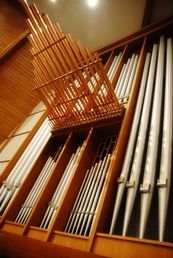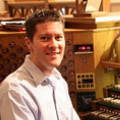 I recently heard about a man working on funeral service preparations for when his time came. When asked about what sort of music would be wanted the man said, “NOT the organ! It reminds me too much of a funeral!” Stories like this can be all too familiar in churches today, where the organ has received a bad reputation. I submit that this “bad rap” can be related to several things that we as organists can lack if we are not careful: a lack of excellence, a lack of variety, and a lack of passion. So, one may ask, “How can I do better?” Here are several things to consider when playing the organ in worship so that the instrument can be utilized effectively: 1. Practice makes perfectIt’s not just a clever saying, it is a fact! Always prepare ahead of time so that when Sunday morning arrives, you are confident in the pieces you will be playing, and you can play with excellence. This does not mean that you won’t hit any wrong notes – this happens to the best of us. But, being thoroughly prepared means that you can be focused on worship. 2. Switch it upWhen playing a hymn introduction, choose something that is fresh and creative that will draw in the listener. Instead of playing the standard first or last line of the hymn, considering starting the hymn introduction in a lower key, then modulating to the singing key. Something as simple as a unique modulation can create that fresh sound that will encourage the worshiper to engage. 3. Take a breathAs you play a hymn, always remember to “breathe” with the song. Think of singing the hymn as you play – this can remind you to phrase properly. Too much sustaining does not promote proper singing and can turn music into “noise”. 4. Register wiselyRegistration is vital to effective hymn playing. When choosing registration, consider the text of each verse and choose appropriate registrations. For example, the third verse of “When I Survey” has a mournful text that commemorates Jesus’ death on the cross. Use softer flutes and principals paired with a balanced pedal. As you move into the final verse, select powerful reeds and mixtures to sound forth “Love so amazing, so divine!" Using the same registration verse after verse is simply dull and uninteresting. 5. Don’t be afraid to “pull out all the stops”! This does not mean that you should play loud all the time, but it does mean that you should not be afraid to use the organ to its utmost potential. For example, the hymn, “Praise to the Lord, the Almighty” should be played in a way that shows God’s amazing power. Include strong reeds and mixtures for the first and final verses. Pull a 32’ reed in the pedal on the last beat. Again, playing big and loud should not be an “every hymn and every verse” thing, but it should be used when appropriate, and we, as organists, should not be afraid to do so. To summarize, playing with excellence should be a key objective every time the instrument is used. I believe many congregations that tend to shy away from the use of the organ do so because it has been played poorly or it has not been used effectively. If you, as the organist, desire to improve, be sure to practice thoroughly and/or consider seeking out a teacher who can help you to hone your skills further. Colossians 3:23-24 states: “And whatsoever ye do, do it heartily, as to the Lord, and not unto men; knowing that of the Lord ye shall receive the reward of the inheritance: for ye serve the Lord Christ.” With this in mind, when we play the organ, remember that we are playing for the glory of Jesus Christ. If that is the case, how could we not give our all, our best for God? What has been your experience with the organ as a part of the worship service? What have you found to be effective in your organ music ministry?  Jason Payne currently serves as organist of Briarlake Baptist Church in Decatur, Georgia. His journey in music includes piano lessons beginning at age 7. By the age of 16, Jason had begun lessons in organ and was playing the organ in worship one year later. He brings many years of experience as a church organist, having served First Baptist of Atlanta, First Baptist of Snellville, as well as churches in North Carolina and South Carolina. Lorenz Music has recently published Jason's first book entitled, "Dynamic Hymn Introductions". Jason is also in the process of having several of his solo organ arrangements published by Lorenz. These works will be available in Fall 2013. Jason's hobbies include improvising and arranging music, golf, travel, gardening, and spending time with his family. More information about Jason can be found on his website, www.jasonpaynemusic.com.
1 Comment
Wayne Morris
10/14/2015 07:03:38 am
I am an organist and agree with what you are saying
Reply
Leave a Reply. |
Search the BlogSubscribe via emailFind By Category
All
Archives
January 2016
|
Harmony Passion - Bringing together ideas and resources for church and community musicians
